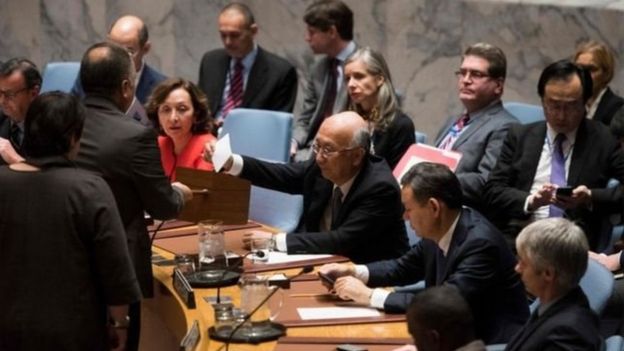The International Criminal Court is the primary legal unit of the United Nations. Its main task in the hawk of the Netherlands is to solve the problems that exist between countries.
Since its tasks are mostly legal expertise, they do not hold prominent news.
In the court that was set up after World War II, a British judge was present in 15 judges. But now Britain has lost that place.
Five judges will be selected once in three of the fifteen judges. Sir Christo Greenwood, a UK-based lawyer and former professor at the London School of Economics, believed that another nine-year term could be selected. Lebanon's former ambassador to the United Nations
This resulted in six candidates contesting for five judges
He has been able to win easily because he has worked for many years in the United Nations.
He was successful in competing where he was assigned to Asian countries. Because of this, the Indian candidate Dalveer Bhandari was compelled to compete for the European countries. The judges were selected for four posts in the previous days. Britain's candidate received support from the UN Security Council and the United Nations General Assembly's UN General Assembly. A candidate must be supported by both organizations to win the post of judge.
The Indian government has made every effort to win. The Indian media has accused the UK of dealing with bad methods for success. Britain's action was compared to former Viceroy Robert Clive's actions. Only some of the illustrations against colonialism were not used to criticize Britain.
But Britain's ministers made different efforts. Both sides tried to use a string of UNs that would create a compromise environment by negotiating "joint meetings".
But there was a lack of support in the Security Council and the trade relations with India and Britain would be affected if the competition was over.
So, after Sir Christopher completed his term at the start of next year, for the first time since 1946, the UK judge will not be in the International Criminal Court.
This reflects the balance of power of the UN Security Council. Its supportive British candidate could not win. Members of the UN General Assembly are changing the powers of the five countries, including permanent members of the Security Council.
It is considered a success for the G-77 countries, which are often emphasizing the need for empowerment, and are often part of developing countries. The loss of Britain in the International Criminal Court is not an unprecedented phenomenon. Last year, France's candidate failed to reach a seat in the International Law Commission. Russia also withdrew from the Human Rights Commission.
This event, however, reflects British diplomatic defeat. Britain's Prime Minister's office refused to confirm whether Britain's Prime Minister Teresa May was directly involved in this diplomatic effort. But senior officers are engaged in supporting Britain's judiciary. They could not get support from the public council.
Britain's Ambassador to the United Nations, Matthew Reigraft, has said that India's nominee, a close ally, has succeeded.
UN Security Council members who voted for judges
Since its tasks are mostly legal expertise, they do not hold prominent news.
In the court that was set up after World War II, a British judge was present in 15 judges. But now Britain has lost that place.
Five judges will be selected once in three of the fifteen judges. Sir Christo Greenwood, a UK-based lawyer and former professor at the London School of Economics, believed that another nine-year term could be selected. Lebanon's former ambassador to the United Nations
This resulted in six candidates contesting for five judges
He has been able to win easily because he has worked for many years in the United Nations.
He was successful in competing where he was assigned to Asian countries. Because of this, the Indian candidate Dalveer Bhandari was compelled to compete for the European countries. The judges were selected for four posts in the previous days. Britain's candidate received support from the UN Security Council and the United Nations General Assembly's UN General Assembly. A candidate must be supported by both organizations to win the post of judge.
The Indian government has made every effort to win. The Indian media has accused the UK of dealing with bad methods for success. Britain's action was compared to former Viceroy Robert Clive's actions. Only some of the illustrations against colonialism were not used to criticize Britain.
But Britain's ministers made different efforts. Both sides tried to use a string of UNs that would create a compromise environment by negotiating "joint meetings".
But there was a lack of support in the Security Council and the trade relations with India and Britain would be affected if the competition was over.
So, after Sir Christopher completed his term at the start of next year, for the first time since 1946, the UK judge will not be in the International Criminal Court.
This reflects the balance of power of the UN Security Council. Its supportive British candidate could not win. Members of the UN General Assembly are changing the powers of the five countries, including permanent members of the Security Council.
It is considered a success for the G-77 countries, which are often emphasizing the need for empowerment, and are often part of developing countries. The loss of Britain in the International Criminal Court is not an unprecedented phenomenon. Last year, France's candidate failed to reach a seat in the International Law Commission. Russia also withdrew from the Human Rights Commission.
This event, however, reflects British diplomatic defeat. Britain's Prime Minister's office refused to confirm whether Britain's Prime Minister Teresa May was directly involved in this diplomatic effort. But senior officers are engaged in supporting Britain's judiciary. They could not get support from the public council.
Britain's Ambassador to the United Nations, Matthew Reigraft, has said that India's nominee, a close ally, has succeeded.
UN Security Council members who voted for judges

Comments
Post a Comment